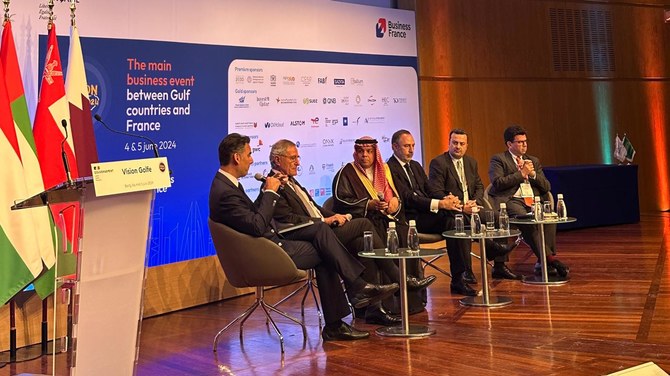Industry leaders and experts explored opportunities in the field of supply chain and transportation and discussed ways to improve collaboration to achieve goals at the two-day Vision Golfe 2024 in the French capital.
The business platform enabled discussions and sharing of knowledge about several industries. The key objective of the event is to promote business cooperation in high-growth markets across both private and public sectors, such as trade, transport, energy, retail, sports, culture, and the environment.
Speaking at a panel on the future of infrastructure and transport corridors moderated by Ali Itani, head of Arab News en français, Abdullah Al-Munif, vice president of commercial business at the Saudi Ports Authority, said: “In 2021, the National Transport Strategy was launched to make Saudi Arabia a global logistics hub, in all aspects, rail, air, logistics.”
The Saudi official stressed the importance of collaboration, both at the national and international levels, to achieve one’s goals.
The discussion was followed by the signing of a memorandum of understanding between the Saudi Ports Authority, known as Mawani, and the Marseille Port Authority (Port of Marseille Fos), to boost collaboration between the two entities.
Al-Munif described the MoU as yet another “milestone” in the ongoing economic transformation journey of Saudi Arabia.
Commenting on the project during the panel, Gerard Mestrallet, special envoy of the French president for the India-Middle East-Europe Logistics Corridor, said: “The objective is to create corridors, to increase trade and connectivity between India, the Middle East and Europe.”
He emphasized increasing cooperation in the fields of transport, energy, renewables, data, and fiber optic and “to benefit from the existence of a corridor to accelerate energy transition.”
Panelists also highlighted the importance of the private sector in the deployment of key infrastructure projects. They viewed fostering partnerships with the private sector as necessary for sustainable global growth, especially amid the ongoing uncertainty and supply chain disruptions caused by several geopolitical factors.
“Supply chain is a demanding and strategic industry. Maritime transportation is complicated, air transport is the key. There is a need for a mix of balance between risks and opportunities,” said Patrice Bergamini, diplomatic adviser to the chairman & CEO of CMA CGM Group.
Highlighting different giga-projects currently under way in the Middle East in the field of transport, Zahi Sabeh, product director for the mainline platform at ALSTOM, said: “We continue to support the different visions of various countries. Proposing high-speed trains as well as sustainable trains… successful transport models around the world, Europe and elsewhere.”
According to Charles-Emmanuel de Beauregard, head of corporate and institutional banking at Qatar National Bank, the financial standing of the Gulf Cooperation Council countries is quite diverse.
While all countries don’t share the same financial profiles or means to carry out infrastructure projects that require long-term engagement, the challenge is about how to secure financing.
“Infrastructure financing requires 20-30 percent in equity. Sovereign wealth funds have an important role to play. Qatar and the UAE have advanced infrastructures, but the big player today is Saudi Arabia and PIF is playing a key role,” said Beauregard.
There is competition to attract foreign direct investment, and while financing follows equity, international banks are tight on liquidity due to the higher interest rate environment on a global level.
Vision Golfe aims to accelerate commercial partnerships between France and key players in the region, such as Saudi Arabia.



